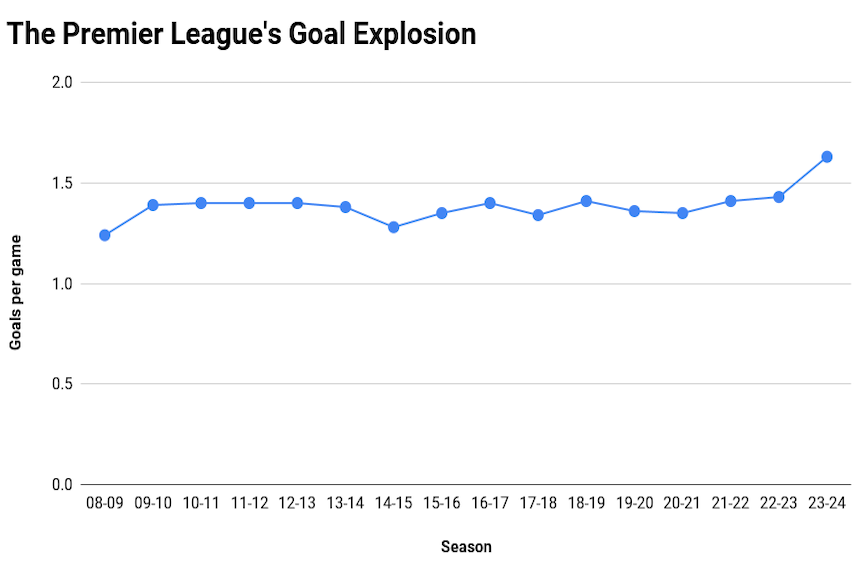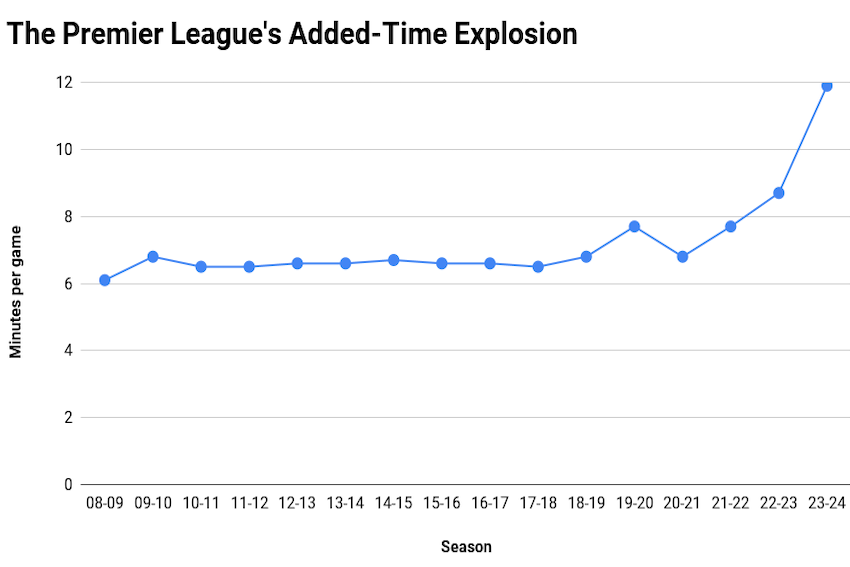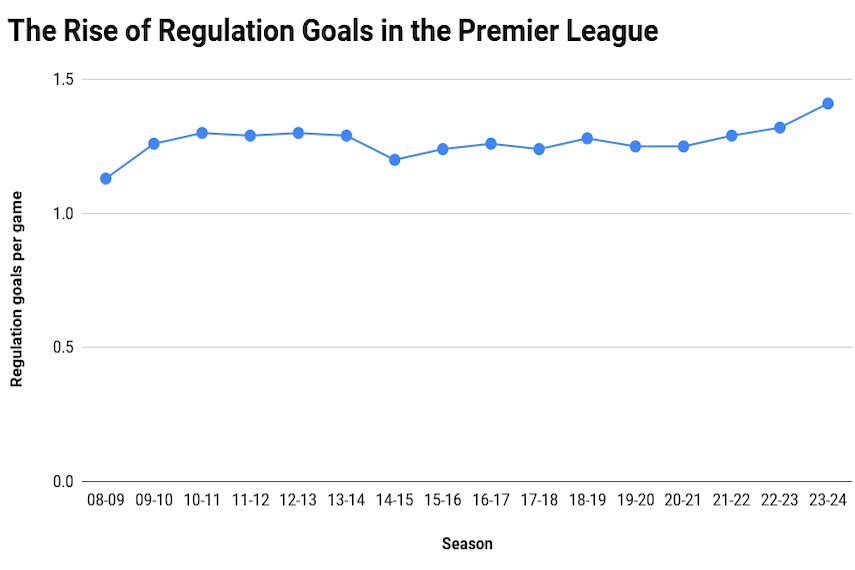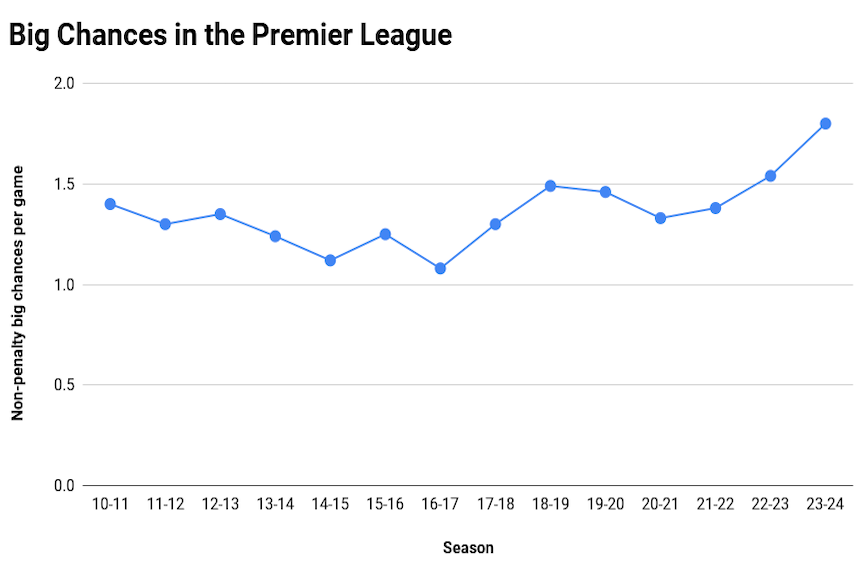Last week, Arsenal squeaked by Porto in penalties in London. Inter Milan coughed up a two-goal aggregate lead and eventually succumbed to Atletico Madrid in a shootout in Spain. Barcelona bounced back from a first-leg draw against Napoli to advance to the quarterfinals. And Borussia Dortmund held on for dear life as they gritted their teeth to a 2-0 victory against PSV Eindhoven.
If you watched any midweek soccer last week, you probably watched one of those Champions League games -- and you probably missed out on one of the games of the season because of it.
While Inter and Atletico were duking it out at the Metropolitano, the more exciting match in Europe was in the Premier League, played at a 12,000-person stadium by the 18th- and 13th-place teams in England's top flight.
In that game, visiting Luton Town jumped out to a 3-0 first-half lead and were seemingly cruising to a result that would've lifted them out of the relegation zone. And then, five minutes into the second half, Bournemouth pulled one back, and then another, and another, and another to cap off one of the greatest comebacks in Premier League history.
If you'd bet 10 bucks on Bournemouth at half-time, you would've won $150 -- they became only the third Premier League team ever to go into half-time down three goals and still win the match. Yet while the comeback was historic, it shouldn't be so surprising. In a larger sense, Bournemouth-Luton was nothing new: Premier League teams are scoring goals for fun this season.
All of a sudden, teams in the Premier League are on pace to shatter the previous record for goals scored in a season. This raises a pretty simple question: what the heck is going on?
The sudden rise in Premier League goals
Here's how the average team's goal scoring has looked, dating back to the 2008-09 season:

For 15 seasons, the level of scoring remained quite stable, oscillating somewhere between 1.24 and 1.43 goals per game, per team. This season, it has boomed up to 1.63 goals per game. (All data for this season is up to the last full round of league matches.)
The per-game numbers don't really properly contextualize what's actually happening and how it affects what you might see on a given weekend. The average throughout the previous 15 seasons was 1.37 goals per game, or 52 goals per season. Extrapolated out to 38 games, the current scoring rate would land the average Premier League side on about 62 goals by the end of the season. That's an extra 10 goals per season, per team, which comes out to about an extra 200 goals overall.
Lots of significant statistical increases are undetectable to the naked eye. As Bill James, the godfather of baseball's analytics revolution, once said, "One absolutely cannot tell, by watching, the difference between a .300 hitter and a .275 hitter. The difference is one hit every two weeks ... The difference between a good and an average hitter is simply not visible -- it is a matter of record."
This season's goal-scoring increase, though, is not just a matter of record. You see and you feel the 200 extra goals. So why is everything so clearly different?
More time equals more goals
The Premier League told us this was coming. After the World Cup experimented with a much more rigorous and therefore increased accounting for added stoppage time in Qatar, English soccer decided it would do the same.
As the chief of referees, Howard Webb, said before the season:
"We'll continue adding time in that precise way we need to for goals and substitutions. Don't forget the only focus we've said to the officials is exact time for goals, exact time for substitutions and exact time when red cards happen or penalties are awarded, everything else is the same apart from being stronger with delaying tactics and time-wasting tactics.
"In the Premier League, we saw 8.5 minutes last year. We looked at the events that happened last year and applied the new methodology, and we think that's going to go up to about 11.5 minutes per game, so three minutes more."
He has been just about right, too. Through matchweek 28, there have been 11.9 minutes of added time in each game. That's a massive increase over the past 15 years:

And in keeping with that, there's also been a massive increase in added-time goals.
There have been 119 goals scored in either first- or second-half injury time this season. That's already 16 goals more than the high-water mark of the previous 15 seasons: the 103 scored in 2016-17. Last season, there were only 84 goals scored in added time.
We still have nearly 100 more games to be played this season.
So ... that's it? More stoppage time?
Compared to the average from the past 15 seasons, there's been a 73% increase in the amount of added time per match, but that's not the only reason additional stoppage time is causing more goals. The rate of goal scoring in added time has increased by 90%: from 0.11 goals per game to 0.21.
Why might that be? Well, not all minutes across all soccer games are created equal.
Per the analyst Michael Caley in a study published via his newsletter, Expecting Goals:
"One underrated statistical fact about football is that goals are not evenly distributed in a match. Roughly 56% of goals are scored in the second half. And it is not a gradual increase over the course of the match, but rather the likelihood of goals increases almost immediately from kickoff in the second half, remains steady through most of the half, and then peaks in second half stoppage time."
Perhaps, then, by adding more time to the end of matches, the Premier League has added even more high-probability goal-scoring time to games.
In other words, if the likelihood of a goal being scored increases as the second half wears on, then we wouldn't just expect for a 73% increase in added time to lead to a 73% increase in goals. No, we'd expect a greater than 73% increase in goals, which is exactly what has happened this season.
But teams are scoring more in regulation, too
The increase in total goals, though, is not only due to an increase in added time. Goals scored in regulation are also on the rise:

The average over the previous 15 seasons is 1.26 regulation goals per game, while this season we're up to 1.41. That's still a decent uptick from the previous high of last season's 1.32. It's about an extra 5.7 regulation goals per team per season, or about 114 more goals overall.
So while extra-time goals have increased at a much higher rate, the increase in regulation goals still comprises the larger chunk of the increase in goals. My first instinct to explain this? Penalties!
With VAR now laser-focused on previously unseen fouls within the penalty area, maybe that could explain the increase on its own. On top of that, Premier League players seem to be getting better at converting penalties. In the 10 seasons since 2008, just three saw penalties converted 80% of the time or more. The conversion rate held relatively steady at around 78%. In the past five seasons, though, the 80% mark has been broken three times. This season, the conversion percentage has ballooned all the way to 88.5%.
Yet, despite the spot-kick excellence across the league this season, regulation penalty goals are up only slightly: 0.11 per game this season, compared to an average of 0.09 over the prior 15 seasons. So, that still leaves an additional 0.13 of regulation goals per game that aren't penalties.
My second instinct: some kind of larger structural change. Perhaps, with the widening financial gap between the Premier League and the rest of the world, Premier League teams have increasingly devoted their resources toward the most expensive players: the ones who score goals. Maybe English clubs have shifted a bigger chunk of their transfer spend toward attackers and, in turn, it's led to more goals?
Not true! In fact, it might even be the opposite.
"Attackers have typically accounted for 48% of annual wage bills in the Premier League between the 13-14 and 23-24 seasons," Aurel Namziu, a senior data scientist at the consultancy Twenty First Group, told me. "This season that figure stands at about 45%, so slightly below average." He added: "Center forwards have typically accounted for 20% of transfer fees each season in the Premier League. This season they accounted for 12% -- again, below average."
And so, what is it? Over a full season, we're on pace for an increase of about 98 regulation non-penalty goals. Where have they come from?
I thought it might be set pieces -- as clubs have finally begun to hire specialist coaches to implement preplanned routines -- but this season isn't an outlier in set-piece goals during regulation. Almost all of the increase comes from open play.
And what do teams do in open play these days?
Thanks to the influence of Jurgen Klopp and Pep Guardiola, Premier League teams both pass more effectively and press more effectively. What happens when teams are passing and pressing better than ever before? We see more teams trying to play out of the back, so that means more opportunities for pressing teams to win the ball high, but we also see teams more able to break the press and then get up a head of steam and attack a defense that is pushed high up the field.
This season, Premier League teams are attempting 67.1% of their shots from inside the box -- the highest mark since 2008 and way above the average of the past 15 years (59%). The average distance from goal on each shot is lower than it's ever been, and the expected-goals value of each shot is creeping ever higher, too.
Stats Perform also records a somewhat controversial stat called "big chances." It's controversial because it's subjective. Here's how they define it: "A situation where a player should reasonably be expected to score, usually in a one-on-one scenario or from very close range when the ball has a clear path to goal and there is low to moderate pressure on the shooter." The person annotating the game decides whether or not the chance is a big chance, and while there are issues with that, it's actually quite useful for our purposes right now.
If teams are creating more chances from a high press and from breaking through a high press, then we would see more "big chances" being created since both situations lead to an attacker bearing down on goal, at speed, with little resistance. While there's no big-chance data until 2010, here's how the progression looks for non-penalty big chances, per team, per game since then:

The average Premier League team is creating 1.8 non-penalty big chances per game this season. (All penalties count as big chances, too, but we've excluded them since we've already been over that.) The previous high was last season's 1.54, while the average for the prior 12 seasons was 1.33. So, roughly, that's about 0.5 extra big chances per game for each team, which means one extra big chance for every Premier League game.
Adding an extra situation per match "where a player should reasonably be expected to score" seems like a pretty simple recipe for massively increasing the number of goals scored in a single season. Will it persist, though?
So long as the league continues to add more extra time to each half, there are going to be more goals. Still, that accounts for a little less than half of the increase in goals we've seen this season. The particular tactical and economic era we're currently in also seems to have created an environment for more goals: lots of money in the league allows teams to adopt more intricate pressing and passing systems that seem to lead to a higher number of high-quality opportunities at both ends. Better players score more penalties, too -- even if the league isn't devoting a bigger chunk of its cash to big-name attackers.
Given how much of it is potentially driven by the tactical bargain being made by managers across the league at this specific moment and how much goal scoring can simply randomly fluctuate from season to season without any explicable underlying changes, I'm not convinced that this massively increased level of scoring is here to stay. But so long as the games are longer and spot kicks are going in more often, then we have officially entered a new era for inflated goal scoring.
That could be the Premier League's new motto: here, you're more likely to see someone score a goal than ever before.
